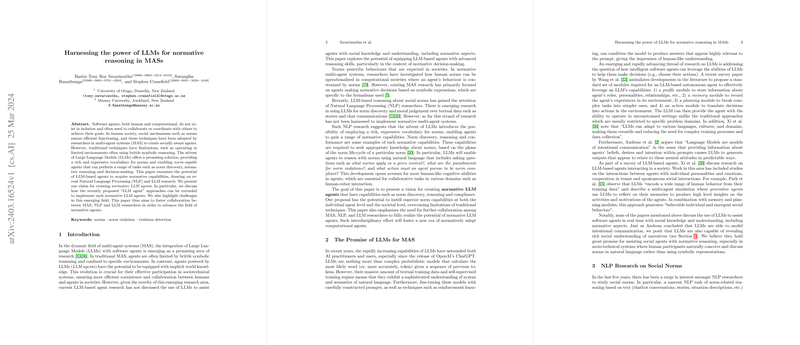Harnessing LLMs for Normative Reasoning in Multi-Agent Systems
In recent years, the integration of LLMs into multi-agent systems (MAS) has emerged as a significant area of research, potentially transforming the landscape of agent-based systems. This paper explores the employment of LLMs for normative reasoning within MAS, an area that seeks to operationalize social norms and facilitate more sophisticated interactions between agents and the environments they navigate. Norms are crucial as they prescribe expected behaviors within societies, and applying them computationally could greatly enhance the performative capabilities of software agents, especially in complex, dynamic environments.
The Context and Potential of LLMs in MAS
Historically, MAS has relied on brittle symbolic reasoning approaches, which confine agents to operate within predefined, limited contexts. Conversely, LLMs—powered by significant advancements in NLP—offer a more flexible, knowledge-rich framework. This evolution allows agents to acquire implicit social knowledge dynamically, essential for their participation in socio-technical systems where human-like interaction is crucial. LLMs can be utilized for several normative tasks, including norm discovery, normative reasoning, and decision-making, positioning them as a versatile tool in the design of norm-capable agents.
LLMs exhibit a profound capability to understand and generate human-like language outputs due to their extensive training data and complex models. This sophistication enables their application in a variety of tasks, ranging from basic language understanding to complex decision-making, effectively lowering the barrier for MAS applications to broader contexts beyond restricted symbolic logic.
Key Capabilities and Applications
The paper argues for integrating LLMs into MAS not only to overcome the traditional limitations but also to enhance an agent's ability to perform complex cognitive tasks that mimic human social behaviors. Notably, NLP researchers have illustrated the potential of using LLMs for tasks like norm discovery in textual formats, moral judgment prediction, and norm conformance. The paper suggests that translating these capabilities into MAS can lead to the creation of agents that can dynamically adapt to and enforce social norms, thus elevating their operational efficiency in real-world applications.
An application within a childcare robotics scenario illustrates the potential of normative LLM agents. Here, a robot assesses situational norms and makes contextually appropriate decisions, demonstrating real-time norm recognition and interaction with human counterparts in a socially relevant manner. Such applications highlight the expansive reach of normative reasoning, extending from standard operational tasks to engaging in culturally and socially sensitive human activities.
Challenges and Future Directions
Despite the promising avenues, several challenges persist. The integration of LLMs into existing agent architectures requires considerable retrofitting and model adaptation. Moreover, the high computational and financial costs associated with training and maintaining LLMs are non-trivial and could impede widespread adoption. The data constraints, especially in low-resource languages, further complicate the fine-tuning necessary for domain-specific norm learning.
Ethical considerations, such as ensuring unbiased decision-making and transparency in norm application, are paramount, particularly when agents operate within human-centric environments. Addressing these challenges will necessitate interdisciplinary collaboration, advancement in prompt engineering, and the development of frameworks for ethical AI deployment in real-world settings.
While MAS, NLP, and LLM research communities are converging to tackle these issues, the paper envisions a robust framework where normative LLM agents become integral to various applications, offering normative judgments and decisions that align with human societal expectations. Continued work in this burgeoning field will likely yield substantial advancements, contributing to the creation of more socially aware and contextually intelligent autonomous agents.
